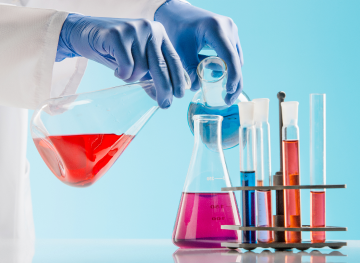

Free Delivery | Same day delivery in select cities
Natural is safe and chemical-free. Well, is it though? From a chemist’s point of view, anything natural also comprises chemicals since all substances are composed entirely of chemicals and energy. [1] Thus arises the question - are all natural things safe and all things containing chemicals bad?
Natural vs Chemical
When we say natural, we definitely mean something that is born in the environment naturally, without any human intervention. We tend to assume that anything natural is free of chemicals but the reality of the situation is much more complicated than that. Chemicals are building blocks for everything in the world - from your body to the medicines you take to the air you breathe. Your food is also chemical and what helps in digesting your food is chemical too. Chemicals play an important role in our daily lives. The toothpaste we use to brush our teeth, the salt we use to season our food, the soap we use for bathing, the pencil we use to write and the diamond we use in our jewellery are all examples of chemicals. [2]
As American author, Dave Barry rightly said, “Not all chemicals are bad. Without chemicals such as hydrogen and oxygen, for example, there would be no way to make water, a vital ingredient in beer.”
But, are all the natural things safe?
Whether natural is safe and chemical is harmful is more than just black or white. Two of the most toxic chemicals for humans are produced naturally. Botulinum toxin is a neurotoxin produced by bacteria spores, which are commonly found in water, soil and intestinal tracts of animals. [3] On the other hand, tetanospasmin is a neurotoxin produced by tetanus-causing bacteria. While castor oil - oil produced by pressing castor beans - is good for the hair and skin, the castor beans which produce the oils are actually dangerous because of the poison. Ricin is naturally present in the beans.
Nature can be lethal and natural does not necessarily mean safer and healthier. [4] Similarly, no chemical can be termed as good or bad either. Science has advanced to extraordinary levels to understand the ins and outs of the human body. Over several decades scientists have been able to isolate the good and weed out the bad. We keep on adding to this history of understanding with every passing decade. For example, we now know that selenium is extremely toxic in high doses but the body also requires it in small amounts for the proper functioning of the immune system so now we can create selenium pills in the lab to avoid deficiencies. [5] [6] [7]
Natural flavours vs. Artificial flavours
Flavours are an important additive in foods and beverages. Whether natural or artificial, flavours do not add any nutritional value to your food. At their core, natural flavours are derived from plant or animal sources and artificial flavours are synthesized in the lab. But all foods, occurring naturally or lab-made, are made up of chemicals. Actually, natural flavours are more unsafe because, in addition to the flavour, they also contain impurities. On the other hand, an artificial flavour is created to match the molecules of the natural flavour but it does not have the uncontrollable extras that the natural flavours bring along. For instance, the natural flavour of vanilla comes from chemical compounds like hydroxybenzaldehyde, hydroxybenzoic acid, anisaldehyde and 200 other compounds. The artificial flavour of vanilla is created by using fewer chemical molecules in the lab. [8]
Natural flavours are more expensive than artificial flavours because the synthetic chemicals in artificial flavours generally cost less to produce than finding the natural sources of chemicals. Consider vanilla again - the compound vanillin, which is responsible for the flavour and smell of vanilla, comes from an orchid that is native to Mexico. The process of extracting this natural “chemical” is very lengthy and quite expensive. Therefore, scientists figured out a way to make a synthetic version of vanillin in the lab. [9]
Final Takeaway
It is a human tendency to associate “natural” with being safe and “chemical” as being toxic. But we tend to forget that everything around us, including all the natural substances, is actually made up of chemicals. If you happen to pluck an apple from a tree and take it to a lab you will notice that the proteins, carbs, water, sugar and everything else in the apple have a chemical composition to it. Chemicals are not bad. H2O is the chemical composition of water. O2 is the chemical composition of air. We cannot survive without these two natural chemicals! But remember, while you need oxygen to breathe, breathing too much supplemental oxygen can cause oxygen poisoning!
Happy Ratio "All-In-One" Nutrition health shakes are free of any harmful chemicals. If you aren’t sure we suggest you grab our Try-It-All Sampler Pack to check it for yourself here!
References:
[1] https://en.wikipedia.org/wiki/Chemical_free
[2] https://www.pure-chemical.com/blog/list-of-chemicals-in-daily-life/
[3] https://www.ncbi.nlm.nih.gov/pmc/articles/PMC2856357/
[5] https://www.ncbi.nlm.nih.gov/pmc/articles/PMC3225252
[6] https://pubmed.ncbi.nlm.nih.gov/15487766/
[7] https://ods.od.nih.gov/factsheets/Selenium-HealthProfessional/